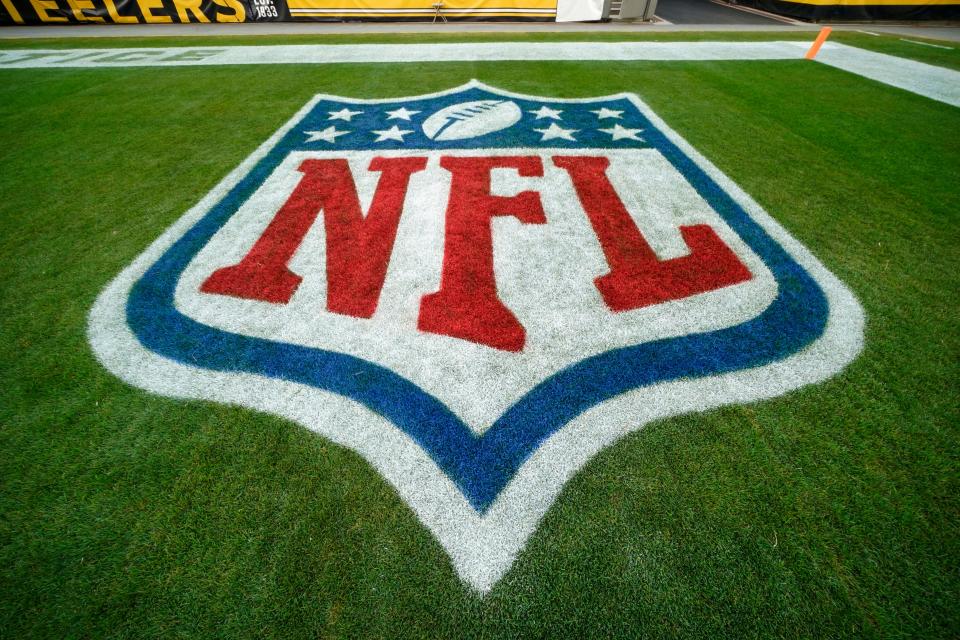Opinion: Once the gold standard on dealing with COVID-19, NFL throws in the towel with testing retreat
After almost two years of treating COVID-19 with the appropriate seriousness, letting science be the guide in developing protocols, the NFL and the NFL Players Association have thrown in the towel.
With a new, more contagious variant threatening to wreak havoc on the postseason, their solution is to test less. Rather than the daily testing for all players that the NFLPA initially requested, the league and the union have decided the answer is, in part, to rely on vaccinated players to “self-report” if they have symptoms.
Putting the onus on players to report is optimistic under the best of circumstances. When they know their absence could negatively impact their team’s playoff hopes, as well as their individual futures in the forms of roster spots and bonuses, it’s incredibly naive.
“I personally have a lot of confidence in our clubs and our players that they have that desire to keep themselves and everyone else safe,” Dr. Allen Sills, the NFL’s chief medical officer, told USA TODAY Sports on Monday. “I believe we’re going to continue to see that going forward.”

And there are people who believe the Detroit Lions have turned a corner. But faith and hope doesn’t necessarily make it so, and the 51 players who landed on the COVID-19 reserve list Monday – the first day of the new, scaled-down testing plan – did not exactly provide reassurance.
The most glaring flaw in the new strategy is that there is a long history in the NFL, and other elite sports, of athletes hiding or ignoring injuries and physical ailments to stay on the field.
Peyton Manning and others have talked about manipulating their baseline concussion tests so they’d have a better chance of being able to keep playing if they had a head injury during the season. Former Lions receiver Calvin Johnson said in 2017 that he’d had concussions and hadn’t told his coaches, and that he wasn’t the only one.
Cleveland Browns quarterback Baker Mayfield is playing with a torn labrum in his left shoulder as well as a non-displaced fracture. Aaron Rodgers is in the running for his fourth MVP award despite a broken pinky toe that keeps him from practicing during the week.
“The team needs me out there on the field,” Johnson said, summing up the mentality. “And sometimes you allow that to jeopardize yourself, but that’s just the nature of the world.”
It’s not just the players, either. The Lions, Pittsburgh Steelers and Las Vegas Raiders have all been fined in recent seasons for not properly reporting injuries – and those are just the blatant cases.
Sure, there will be some players who will be responsible enough to say they’re sick, as Seattle Seahawks wide receiver Tyler Lockett and Steelers quarterback Ben Roethlisberger did this season. Teams concerned enough to go above and beyond the NFL’s protocols, as the Seattle Seahawks have this season.
But some players have already shown a willingness to skirt COVID protocols – welcome back from your three-game suspension, Antonio Brown – while teams like the Green Bay Packers have shown how hard it can be to hold players, particularly the big-name ones, accountable.
With the playoffs looming and the stakes for each game rising, so, too, will the pressure for everyone to be available.
No matter what.
This is even assuming players know they’re sick.
Because the NFL was so proactive about vaccinations and boosters, many of the players and coaches who are testing positive now are either asymptomatic or have mild symptoms. Of the Washington Football Team’s 23 cases last week, only two were noticeably sick enough to have raised concerns without testing.
“I think the telling number is that there are two that I would’ve kept out of a practice had I not known they had COVID,” said Dr. Tony Casolaro, the WFT’s chief medical officer and president of the NFL Physicians Society.
And therein lies the problem. The omicron variant is still new enough that, while we know it can cause breakthrough cases, we don’t know how easily it’s spread by vaccinated people.
More: COVID-19 continues to disrupt sports world: More NHL teams shut down, USA-Canada women's hockey off
More: Opinion: NFL teams better buckle up. COVID outbreaks could bring mayhem to the playoffs.
The NFL is currently in intensive protocols that require everyone to wear masks at facilities, but those are being revisited this week. If a vaccinated player has COVID-19 but is asymptomatic, isn’t being tested on a regular basis and mask requirements are lifted, how can the NFL be confident there won’t be more outbreaks like the ones there were last week?
It can’t.
“We’re always worried about spread,” Sills said. “We just have not seen that happening within the course of the season, widespread outbreaks driven by people who are sick.”
We’ve not seen a variant like omicron, though, either.
Until now, the NFL has been the gold standard in modeling good behavior to keep COVID-19 at bay. But continuing that likely meant further disruptions to the season and the playoffs, as well as a possible asterisk next to the Super Bowl champion.
So after two years of vigilance, living with COVID-19 suddenly didn't seem so bad.
Follow USA TODAY Sports columnist Nancy Armour on Twitter @nrarmour.
This article originally appeared on USA TODAY: NFL's about-face on COVID testing and self-reporting is a copout

